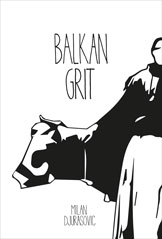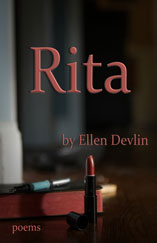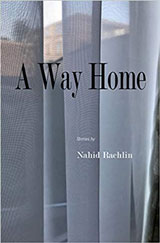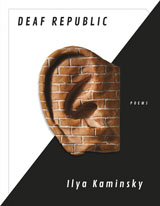Recently, we released two new books. Balkan Grit by Milan Djurasovic and Rita by Ellen Devlin.
We are excited about these summer releases.

Balkan Grit by Milan Djurasovic
Milan Djurasovic is a Bosnian American writer, artist and journalist. He currently lives and works in Sacramento, California.
His educational background is in psychology and Russian literature. Milan has published dozens of articles and short stories
in various international magazines. His most recent publication includes a book of fiction No More Happy Endings
(published in 2016).
$17.00 | ISBN: 978-1-950063-21-5 | 80 Pages
Small Press Distribution recently recommended this book.
Congratulations to Milan Djurasovic
|

Rita by Ellen Devlin
Ellen Devlin's poetry has been published or is forthcoming in The Cortland Review,
Ekphrasis, Lime Hawk Review, PANK, The New Ohio Review, The Sow's Ear and Women's Studies Quarterly Review.
One chapbook is forthcoming from Cervena Barva Press, "Heavenly Bodies at the MET." She lives in Irvington,
New York, with her husband, Charles.
$8.00 | ISBN: 978-1-950063-13-0 | 36 Pages
|
Right now, there are 6 books about to be proofed.
Cervena Barva Press has been scheduling so many events. Be sure to check our
"Readings Page" on our website.
New to our events, will be a monthly translation poetry roundtable.
The first one is Friday, September 6th at 7:00PM. Here is the flyer. We hope to see you.
A huge thank you to Renuka Raghavan, Karen Friedland, and Melissa Silva for all the help they have been giving me.
I am so grateful.
Thank you to Simone Schreuer, my intern from Emerson College. She has been working with me for months
and will continue in the fall. We are working on a new website which will take a long time. There are
thousands of pages! She designed it which is so exciting!
This fall I will have 3 interns starting to work with me. The press has grown so much that all the help happening
is pure heaven! Once I teach the interns what to do, it will be nice. I look forward to it.
Next month I will go back to listing my Raves section for new books out. There are so many wonderful books out there.
The Lost Bookshelf Bookstore was open 3X a week in July (All different hours) except the last week when I left for NC.
It was slow and not much foot traffic due to the location. (Even with parking in the back of the building!!!)
So I decided starting in September, the store will be open a half hour before any of our events and after our events.
This way if you attend one of our events, you can check out our books. In September the store will be open on the
first 2 Saturdays of the month from 10:00-12:00. I will open the store by appointment if I know you.
In October, November and the first half of December, the bookstore will be open from 9:30AM-12:30PM on Saturday.
So many of you have donated books which I am so grateful for. There are so many wonderful used books because
of you! Most used books are $3.00 and under. There are only a few exceptions. We also take books on consignment.
Due to our limited space, we no longer will accept 5 books each. It will now be two books on consignment.
If I need more, I will contact you. The form on our bookstore website will be changed to reflect this.
Our used book sales help Cervena Barva Press going. We really need the sales!!!
Spotlight on writer Nahid Rachlin by Karen Friedland 7/16/2019
After being traumatically separated from the aunt who raised her in Tehran,
"I looked to books for answers," explains novelist and short-story writer
Nahid Rachlin. "Loving to read led to wanting to write, to put floating ideas
into shape and form."
A native of Iran, Nahid Rachlin's publications include a memoir, Persian Girls (Penguin),
novels, Jumping Over the Fire (City Lights), Foreigner (W.W. Norton), Married to a Stranger
(E.P.Dutton), and short story collection, A Way Home (Ravenna Press).
Rachlin's short stories have appeared in Solstice Literary Magazine,
The Virginia Quarterly Review, Prairie Schooner, Southern Humanities Review,
Redbook and Shenandoah. Her work has been translated into Portuguese, Polish,
Italian, Dutch, German, Czech, Arabic, and Persian. She's taught creative writing
at Barnard College, Yale University, the New School and at a wide variety of writer's conferences.
I recently spoke briefly with Ms. Rachlin about her writing practice.
What are you working on right now?
I'm working on a bunch of stories...collecting material for a novella, and also a new novel. I usually start with an idea
I'm fascinated by...it's hard to know what form it will take!
Where and how do you like to work?
I usually like to get started at around 10:30, after reading the New York Times. I typically write for 2-3 hours a day.
I prefer writing in my own room, but I don't mind being distracted-it's actually refreshing. I'd have a hard time
sitting in one place, writing all day. I enjoy teaching, especially at Summer Writer's Conferences, because there
are students from all over. I like intermingling with people with the same literary aspirations-it's very stimulating.
What advice do you have for writers?
Be absolutely passionate about writing...keep going...and hope for the best!

Thank you Karen for speaking with Nahid. I have known Nahid for years. She is an amazing writer and I think the world
of her. I hope you will pick up a copy of her newest book, A Way Home. It is available from Ravenna Press and Amazon.
Please support Ravenna Press and order from them.
http://ravennapress.com/books/a-way-home/
https://www.amazon.com/Way-Home-Nahid-Rachlin/dp/0999592130/ref=sr_1_2?keywords=books+nahid+Rachlin&qid=1565644728&s=gateway&sr=8-2


Deaf Republic
Ilya Kaminsky
Minneapolis: Graywolf Press, 2019
ISBN 978-1-55597-831-0
$16.00
Reviewed by David P. Miller
As Ilya Kaminsky's Deaf Republic tells a story, we may begin with its plot.
The town of Vasenka is occupied by soldiers. A deaf boy, Petya, is murdered by soldiers at a puppet show;
in this moment, all of the townspeople also become deaf. The rest of the story takes place within the turmoil
of the occupation, with acts of resistance and the deaths of townspeople and soldiers. Alfonso and Sonya Barabinski,
puppeteers, become parents of baby Anushka. Both parents are arrested and murdered; Anushka is adopted
by Momma Galya, the head of the puppet troupe. The women puppeteers serially seduce and strangle soldiers,
leading to mass retaliation against the townswomen generally and Galya's own death. The narrative
ends with the continuing occupation of Vasenka. If "spoilers" concern you, you probably should
not have read this far. The depth of this work, however, relies not at all on reader suspense. The story,
compelling on its own terms, is at the same time a framework for nesting questions with few if any resolutions.
More broadly, Deaf Republic is an outstanding achievement, with its depth of insight, formal beauty,
and exquisite language.
Deaf Republic's opening and concluding poems frame the Vasenka story, outside of and interlocked with it.
The first lines of the first poem, "We Lived Happily During the War," immediately implicate the reader
in an uneasy relationship with not only the speaker, but also with a concerned-but-distant response to the
barbarism about to unfold: "And when they bombed other people's houses, we // protested / but not enough,
we opposed them but not // enough." What could "enough" mean for us who, at this moment, can still say
"I took a chair outside and watched the sun," and might wish "we (forgive us) // lived happily during the war"
to be accepted as confession?
Deaf Republic lives in a generically uncertain space. The "Dramatis Personae" (7),
a useful anachronism, suggests that what follows may be read as a drama although not a play (well, perhaps a puppet play).
The poems oscillate between genres including long-ago narrative (distant city, town square puppet show) and intimate,
often erotic lyric; the secure containment of the framing poems, as we'll see, is finally undermined. Voice -
the speaker/s identity/ies - is also unsettled. On the surface, the use of first and third persons seems as
straightforward as a folktale. Kaminsky notes in "Dramatis Personae" that "we" means the townspeople of Vasenka,
who serve as a chorus. "I" designates Alfonso in Act One, Galya in Act Two. This gives us an entrée,
but there's slippage. Early on, as Petya lies in the street, the speaker(s) instruct,
"Observe this moment / -how it convulses-"(12). Who is the addressee? Such an imperative,
arcing out from the tale to the readers, is rare but deliberate. This slight ambiguity
intensifies near the end of Act Two, as uncertain instances of "I" emerge. Here is the brief
"And While Puppeteers Are Arrested":
silence?
it is a stick I beat you with, I beat you with a stick, voice, beat you
until you speak, until you
speak right.
This "I" cannot easily be assigned to Galya. And who is the "I" after Galya's death, in the poem "Anonymous"
and its suddenly unidentified speaker? Here we read "Today / I have to screw on the expression of a person //
though I am at most an animal / and the animal I am spirals // from the funeral to his kitchen [ ... ]" (70)?
What I see in these instances and others is a crack in the membrane between the framing poems and the main
body of the work. The "we" of the frame - we, the readers distant from suffering - elides with the townspeople;
the "I" of "Anonymous" is nearly the speaker who watches neighbors open their cell phones "In a Time of Peace."
Deaf Republic is suffused with the life of the body, love, and eros, in opposition to the occupiers' corpse-orientation.
In one of the stark juxtapositions which give this work its dynamism, consider the segue, in Act One,
from "The Townspeople Circle the Boy's Body" to "Of Weddings Before the War." The former ends with a
collision between Petya's corpse in the town square and the unborn Anushka: "We watch Sonya stand
(the child inside her straightens its leg). Someone has given her a sign, which she holds high above
her head: THE PEOPLE ARE DEAF." The poem following is a delight of unpoliced intimacy, including:
The landlady might've noticed
a drizzle of stains on the sheets-
angels could do it more neatly
but they don't. I can still climb your
underwear, my ass
is smaller than yours!
Two poems later (following the equally captivating "Still Newlyweds") we are ripped back into the political story.
Images in "Soldiers Aim at Us" express the occupation's brutal instrumentalization of the body: "They fire / as the
crowd of women flees inside the nostrils of searchlights [ ... ] a helicopter eyeballs my wife-".
The occupation's drive is sterile at the root. Aside from dealing murder, the soldiers' only notable bodily response
is the urge to be fellated by "Galya's Puppeteers" (56), a narrow physicality leading to their vodka-enhanced deaths.
Although some are referred to by name in the third person, they do not exist as individuals. (Deaf Republic is not a
fine-people-on-both-sides tale. Sonya, naked, is put on display before her assassination
"under a TROOPS ARE FIGHTING FOR YOUR FREEDOM" poster (33). No argument for sentimental civility here.)
Against this is the joyful, leaking, anarchic, subjective life where body, spirit, and mentality are inseparable.
Act Two opens with Galya's irresistible eros: "Momma Galya Armolinskaya, 53, is having more sex than any of us. [ ... ]
Your iron bicycle tearing with bright / whiskey anthems / through an advancing rank of soldiers into // daylight.
You pedal barefoot wearing just / shorts. // And let the law go whistle." In the only poem in Deaf Republic that
is not fundamentally left-justified, "When Momma Galya First Protested," her persona spills across the page,
including her hilarious cry, "Deafness isn't an illness! It's a sexual position!" Baby Anushka's body functions
are received with wonder and surprise. After Sonya's death, the poem "To Live" ends with this from Alfonso:
"I am singing as she pisses // on my forehead and my shoulders!" Later, Galya shouts to her neighbors:
"Come here! / Marvelous cretins! // She just pooped on the park bench, marvelous cretins!"
("Galya Whispers, as Anushka Nuzzles"). The raucousness of "piss" stands out even more against murdered
Alfonso's bodily abjection: "Alfonso hangs from a rope. Urine darkens his trousers. // The puppet of his hand dances." ("Away")
Puppets are included in the Dramatis Personae; their ambiguous presence pervades Deaf Republic.
It is well known that puppets, although inanimate in themselves, nevertheless possess latent powers of
ineffable vitality. They exist liminally as both objects and beings. The first to appear is made to mock a soldier
("Gunshot"), and the soldiers' assembly-line blowjob/killings by the puppeteers mirrors this relationship: they're
self-created sex puppets. Puppets "hang on doors and porches of the families of the arrested," and well after his
hanging, "Alfonso's body still hangs from a rope like a puppet of wind" ("A Bundle of Laundry"). Puppets
are therefore both symbols of resistance (they do not hear) and memory, and abandoned remnants of the destroyed.
The occupation's inability to comprehend the radical subjectivity of each human life, its fusion of physicality
and spirit, is manifest in "Firing Squad," near the end of the book. Here is the conclusion:
Tonight they shot fifty women on Lerna Street.
I sit down to write and tell you what I know:
a child learns the world by putting it in her mouth,
a girl becomes a woman, and a woman, earth.
Body, they blame you for all things and they
seek in the body what does not live in the body.
The opposition is most concise in the three poems titled "Question," spaced at equal intervals through the book.
The first, entirely: "What is a child? / A question between two bombardments." "Man" and "woman" later appear in
place of "child."
Deafness appears in part as a willed condition of resistance (addressed below). The townspeople communicate through
signs: these pervade Deaf Republic as a semi-independent stratum, not actually textual and subtly ambiguous.
This sign language perhaps sprang into being with Petya's murder, as suggested in the Dramatis Personae,
where Galya's Puppeteers are described as "teach[ing] signs from the theater balcony, as if regulating traffic."
This is followed by verbal descriptions of the signs for Soldier, Snitch, and Army Jeep. Although these are,
interestingly, not illustrated, the description of Snitch - "fingers peck both eyes" (7) - resembles
the sign for The Town Watches: two hands crossed at the wrists with extended index and middle fingers.
The reader's close attention to the illustrations is rewarded with a subtext that is more than an
accompaniment to the written text. The signs tell a story complementary to the words, but not entirely,
and individual signs contain divergent meanings. For example, the first page of Act Two shows the sign for
"Story" in two images of two hands, first with the palms pressed together, second with palms opened like a
book. This seems clear enough, but it's possible to miss its later reversal on the page for "Soldiers Don't
Like Looking Foolish." As the occupation arrests and executes the puppeteers, the order reverses and the
book closes. Even more subtly, the caption for the "Town watches" sign, present on multiple pages, shifts
to "The crowd watches" with the poem "The Trial," as the townspeople turn against Galya: "My sister was
arrested because of your revolution, one spits in her face." The connection of "watching" with "witnessing,"
uncertain throughout this work, is unsettled here.
Other signs, some of which appear only once, have a quiet lyricism. Among these is "Earth," on the page
with the poem "Yet, I am," where Galya asks Anushka, "How do we live on earth, child?" And the final page
of Act Two (73) consists entirely of an uncaptioned sign sequence: Town / The Town Watches / Earth / Story.
Although the second could also now be "the crowd watches," I read it as confirming the first sign, "Town,"
where two hands come together to make a roof. This essentially concrete poem is foreshadowed by another,
where captioned signs for "Army convoy" and "Hide" make their only appearances on a page otherwise without
text (21).
At last, there is the very concept of deafness, seemingly straightforward at the narrative surface, but elusive
as one reads more closely. It anchors a cluster of related ideas, notably silence and hearing vs. listening.
Is deafness a neurological condition, an existential choice, an act of resistance? All of these or something
in between? At the surface, the town's sudden deafness seems a kind of miracle: in the unstated moment of
Petya's murder, "The sound we do not hear lifts the gulls off the water" (11). This threshold instant is
surreal: a gunshot forceful enough to frighten a distant flock of birds, yet already not heard by the people.
Unless not hearing is an act of refusal masking as a physical state:
Our country woke up next morning and refused to hear soldiers.
In the name of Petya, we refuse.
At six a.m., when soldiers complement girls in the alleyway,
the girls slide by, pointing to
their ears. [ ... ]
Our hearing doesn't weaken, but something silent in us strengthens.
("Deafness, an Insurgency, Begins")
The apparent inability to hear masks refusal to listen. Hearing is a portal to listening, but listening implies mutuality,
the willingness to receive another's message. For the townspeople, these messages are toxic propaganda to be shut off.
In private, Galya says: "To bed, Anushka! // I am not deaf / I simply told the world / / to shut off its crazy music for
a while" ("The Little Bundles"). The occupation, of course, unable to grasp the resistance's subjectivity, replies with
"DEAFNESS IS A CONTAGIOUS DISEASE. FOR YOUR OWN PROTECTION ALL SUBJECTS IN CONTAMINATED AREAS MUST SURRENDER TO BE
QUARANTINED WITH 24 HOURS!" ("Checkpoints")
On the book's back cover, Kaminsky is quoted as saying: "The deaf do not believe in silence. Silence is the
invention of the hearing." The hearing's concept of silence as negation, absence of substance, is unsettled
by the townspeople's silences. On the outside, they match un-hearing with un-speaking, enforcing a verbal
silence (although individuals do shout and cry out). The deeper silences are internal. When Sonya is taken,
the soldiers "shove her / and she zigzags and turns and trips in silence // which is a soul's noise."
("What We Cannot Hear") "The Townspeople Watch Them Take Alfonso" concludes: "They take Alfonso / and no one stands up.
Our silence stands up for us." At the end of the narrative, after the town's surrender, this single line
appears on an untitled page (72):
We are sitting in the audience, still. Silence,
like the bullet that's missed us, spins -
These silences cannot be made to be one thing unpacked by any reader. The word silence itself marks each person's most
intimate territory, no matter what the subjugation: "And yet, on some nights, townspeople dim the lights and teach their
children to sign. Our country is the stage: when patrols march, we sit on our hands. Don't be afraid, a child signs to
a tree, a door" (71). As Kaminsky puts it with stark beauty:
Such is the story made of stubbornness and a little air -
a story signed by those who danced wordless before God.
Who whirled and leapt. Giving voice to consonants that rise
with no protection but each other's ears.
We are on our bellies in this quiet, Lord.
[ ... ]
What is silence? Something of the sky in us.
There is finally the concluding framing poem, "In a Time of Peace." We've seen that we, the objects of
"We Lived Happily During the War" are neither condemned by the speaker (who is, after all, one of "we")
nor easily absolved. Absolution is further denied, with damning understatement, at the opening:
Inhabitant of earth for fortysomething years
I once found myself in a peaceful country. I watch neighbors open
their phones to watch
a cop demanding a man's driver's license. When the man reaches for his wallet, the cop
shoots. Into the window. Shoots.
It is a peaceful country.
Kaminsky need not tell us that the murdered man has darker-toned skin, just as he need not name Michael Brown
when he says "Ours is a country in which a boy shot by police lies on the pavement / for hours." Recall that
"The body of the boy lies on the asphalt / like the body of a boy" ("That Map of Bone and Opened Valves")
described Petya's corpse, almost exactly mirrored here with "The body of a boy lies on the pavement exactly
like the body of a boy -" (75). With watching as different from witnessing, "The town/crowd watches" is
linked with cell phone voyeurism. Finally, we read the story of Vasenka as a deep parable, the framing
poems as statements of an almost stupefied inability to act from our own subjectivity. After all, on a
beautiful evening, one might very well say "How bright is the sky (forgive me) how bright."

We need funds to keep going and to survive. We pay rent on our space at the Armory and our event
admissions don't even come close to paying the rent.
Running an independent press takes money. We have published well over 200 books.
I would like to remind you of the many things the press offers: Pastry with Poets (workshops),
Poetry Roundtables, Translation Poetry Roundtables, Portrait of an Artist & Poet Series,
Cervena Barva Press Reads Around the World, Read America Read, Free workshops, Reading series,
and Monologue Mondays.
- If you donate $10.00-$19.00, receive a Cervena Barva Press Chapbook
- $20.00-$29.00, receive one book
- $30.00-$49.00, receive one chapbook, one book
- $50.00-$75.00, receive 2 books
- $76.00-100.00, receive 2 books, 1 chapbook
- $101.00-$300.00, Receive 3 books, 1 chapbook
- $301.00-$500.00, receive 4 books and 2 chapbook and a small writing notebook with a pen that will fit in your pocket or purse.
- $501.00 -$750.00, receive 5 books, 3 chapbooks and free admission to all Cervena Barva Press events,
a small writing notebook with a pen that will fit in your pocket or purse.
- $1,000.00 and above, Receive all books published in a year and chapbooks, free admission to all Cervena Barva Press events,
and a small writing notebook with a pen that will fit in your pocket or purse.

Ways to help:
Donate money using PayPal here!
Donate money by check, payable to Cervena Barva Press, PO Box 440357, West Somerville, MA 02144
Donation of books, volunteering, inquiry about workshops, contact Gloria at:
editor@cervenabarvapress.com
Thank you!
You can also donate white or cream paper (24 pound) or white or cream cardstock (100 pound) from Staples. We can always use this.
We need volunteers to hang flyers around at various bulletin boards and to post at university bulletin boards.
Help us get the word out about our events. When you receive an email flyer, please send it to your list too.
If you donate to the press, we wanted to send you something as a thank you.
I wish it could be more. Even our volunteers will receive something.
Cervena Barva Press Staff
- Gloria Mindock, Editor & Publisher
- Flavia Cosma, (Canada, Romania) International Editor
- Helene Cardona, Contributing Editor
- Andrey Gritsman, Contributing Editor
- Juri Talvet (Estonia), Contributing Editor
- Tim Suermondt, Book Reviewer, Poetry
- Pui Ying Wong, Book Reviewer, Poetry
- Renuka Raghavan, Book Reviewer, Fiction and Publicity/Events Flyer Designer
- Karen Friedland, Interviewer
- Melissa Silva, Promotion
- William Kelle, Webmaster, Book Designer
See you next month!


If you would like to be added to my monthly e-mail newsletter, which gives information on readings,
book signings, contests, workshops, and other related topics...
To subscribe to the newsletter send an email to:
newsletter@cervenabarvapress.com
with "newsletter" or "subscribe" in the subject line.
To unsubscribe from the newsletter send an email to:
unsubscribenewsletter@cervenabarvapress.com
with "unsubscribe" in the subject line.

Index |
Bookstore |
Our Staff |
Image Gallery |
Submissions |
Newsletter |
Readings |
Interviews |
Book Reviews |
Workshops |
Fundraising |
Contact |
Links
Copyright © 2005-2019 ČERVENÁ BARVA PRESS - All
Rights Reserved

